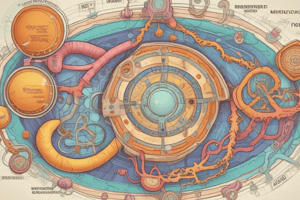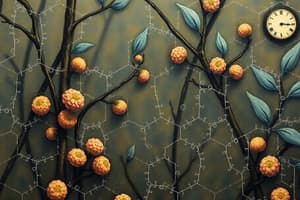Podcast
Questions and Answers
What are the elemental compositions of carbohydrates?
What are the elemental compositions of carbohydrates?
- Carbon, hydrogen and nitrogen
- Carbon, oxygen and sulfur
- Carbon, oxygen and nitrogen
- Carbon, hydrogen and oxygen (correct)
Why are carbohydrates a major source of energy for cells?
Why are carbohydrates a major source of energy for cells?
- They are complex molecules
- They are found in all living organisms
- They are easily broken down to produce ATP (correct)
- They are abundant in nature
What is the main role of carbohydrates in cells?
What is the main role of carbohydrates in cells?
- RNA synthesis and translation
- Cell-cell recognition and DNA synthesis
- Protein synthesis and cell division
- Structural support and energy source (correct)
What is the term for carbohydrates that contain a single sugar molecule?
What is the term for carbohydrates that contain a single sugar molecule?
How are sugar molecules bonded together in carbohydrates?
How are sugar molecules bonded together in carbohydrates?
What type of carbohydrate is maltose?
What type of carbohydrate is maltose?
What is the classification of monosaccharides containing the aldehyde group?
What is the classification of monosaccharides containing the aldehyde group?
What is the term for carbohydrates that consist of chains of monosaccharide or disaccharide units?
What is the term for carbohydrates that consist of chains of monosaccharide or disaccharide units?
What is the primary function of glucose in human cells?
What is the primary function of glucose in human cells?
What is the main difference between aldoses and ketoses?
What is the main difference between aldoses and ketoses?
What is the product of the reaction between two glucose molecules?
What is the product of the reaction between two glucose molecules?
Why are disaccharides not able to pass through the cell membrane by diffusion?
Why are disaccharides not able to pass through the cell membrane by diffusion?
What is the main difference between ribose and deoxyribose?
What is the main difference between ribose and deoxyribose?
What is the purpose of Benedict's reagent in relation to sugars?
What is the purpose of Benedict's reagent in relation to sugars?
What is the reason why galactose cannot play the same part in respiration as glucose?
What is the reason why galactose cannot play the same part in respiration as glucose?
What is the main difference between glucose and fructose?
What is the main difference between glucose and fructose?
Flashcards are hidden until you start studying
Study Notes
Carbohydrates
- Carbohydrates are molecules composed of carbon, hydrogen, and oxygen atoms.
- They serve as a major source of energy and provide structural support for cells and facilitate cell-cell recognition.
Classification of Carbohydrates
- Carbohydrates can be categorized into three types based on the number of sugar units they contain:
- Monosaccharides: single sugar molecules (e.g., glucose, fructose)
- Disaccharides: two monosaccharides covalently linked (e.g., maltose)
- Polysaccharides: polymers consisting of chains of monosaccharides or disaccharides (e.g., starch, cellulose)
Monosaccharides
- Monosaccharides can be further classified based on the number of carbon atoms they contain:
- Triose (3 carbon atoms)
- Tetrose (4 carbon atoms)
- Pentose (5 carbon atoms)
- Hexose (6 carbon atoms)
- Monosaccharides can also be classified as aldoses (containing an aldehyde group) or ketoses (containing a ketone group)
Examples of Monosaccharides
- Glucose: an aldose, the most important carbohydrate fuel in human cells
- Galactose: an aldose, similar in structure to glucose
- Fructose: a ketose, differs from glucose and galactose in structure and properties
- Ribose and deoxyribose: pentoses, components of nucleotides in RNA and DNA, respectively
Disaccharides
- Formed when two monosaccharides react
- Soluble in water, but too large to pass through the cell membrane by diffusion
- Broken down in the small intestine during digestion to give smaller monosaccharides
Studying That Suits You
Use AI to generate personalized quizzes and flashcards to suit your learning preferences.




